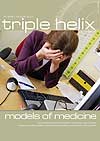You used to moderate the CMF Forum on the big doctors-only website, doctors.net.uk, so presumably you've been a fan of electronic communication for a while?
GC: Yes – it's rapid, cheap and reaches many people at once. That of course has its dangers: hastily written emails, replied 'to all' are often a source of regret! Relationships should be between people, not pixels. But handled wisely, electronic communication serves as a tool to connect people and disseminate ideas far more effectively than previously.
What do you think of the current CMF website, www.cmf.org.uk?
GC: It's pretty good as a library of information and resources: we've got access to Nucleus, Triple Helix and CMF Files, which is great when looking for articles on specific topics. It's useful for getting information about CMF, but there's only limited interactivity: we can send emails through the website, update our member information, book for conferences, or order books. But we can't collaborate or network – both of which could be better served by Facebook.
We understand all these new media integrate easily? Is that the most important thing about them?
GC: It's certainly very helpful. Because they all integrate so easily, the same information can be sent very efficiently: eg, by posting a quick 'tweet', both a blog and a Facebook page can be updated simultaneously. Each of them can direct users to the others; Twitter can alert users to a new audio download available on the website; Facebook can link users to the Doctors.net.uk forum to discuss topical issues.
So why have you been so keen for CMF to have Facebook, etc?
GC: Few people use all these media; most use some of them. If we want to reach as many members as possible, we need to realise that some prefer post, some email, but that increasingly people look to Twitter, blogs or Facebook. And not just for communication, but collaboration: these allow members to contribute their own ideas and engage with each other. Facebook also gives CMF a 'presence' in another public arena, letting the world see the role we play.
But aren't all these sorts of things just fads that come and go? Hasn't a big social networking site just gone bust?
GC: That's true, but it's no reason not to grasp the opportunities while they're there. When Paul went to Athens, he went to the Areopagus, the place of public discourse. We should be where people are; today that includes Facebook, tomorrow something different. We need to use the means of communication God's provided.
Can you just sum up the advantages of these sites?
GC: Beyond what the CMF website 'library' can offer, these social media provide rapid, mass communication; a means of networking and discussion for members; and a presence in the public arena.
Be honest. What practical problems are there?
GC: We need to be careful we don't compromise ourselves. Remember that Facebook is public – privacy and confidentiality need to be respected. It'd need to be moderated for inappropriate postings, and it might take time to administer.
Elsewhere you have said 'time wasting triviality and retarded relationships'. Surely Christian organisations shouldn't encourage students to spend hours electronic navel-gazing? Wouldn't the same time be better spent on a proper Quiet Time, with Bible study and prayer and reflection? Can't we be virtuous and not virtual?
GC: That people read unhelpful novels is no reason not to provide good Christian literature. People do misuse the internet, both in the time they waste and the content they view. But that's no reason not to provide a helpful and constructive resource to benefit people. Would they be better served in time spent with other Christians, deepening personal relationships and studying the Bible and praying? Of course. But that applies to reading Christian books too. The resources we provide, whether in books, journals or websites, should all direct people to know and love God and his people more. I hope our 'social media' will establish relationships online that are then realised in person, and will direct people to resources that through God's Word, deepen their relationship with God. Soli Deo Gloria!
































